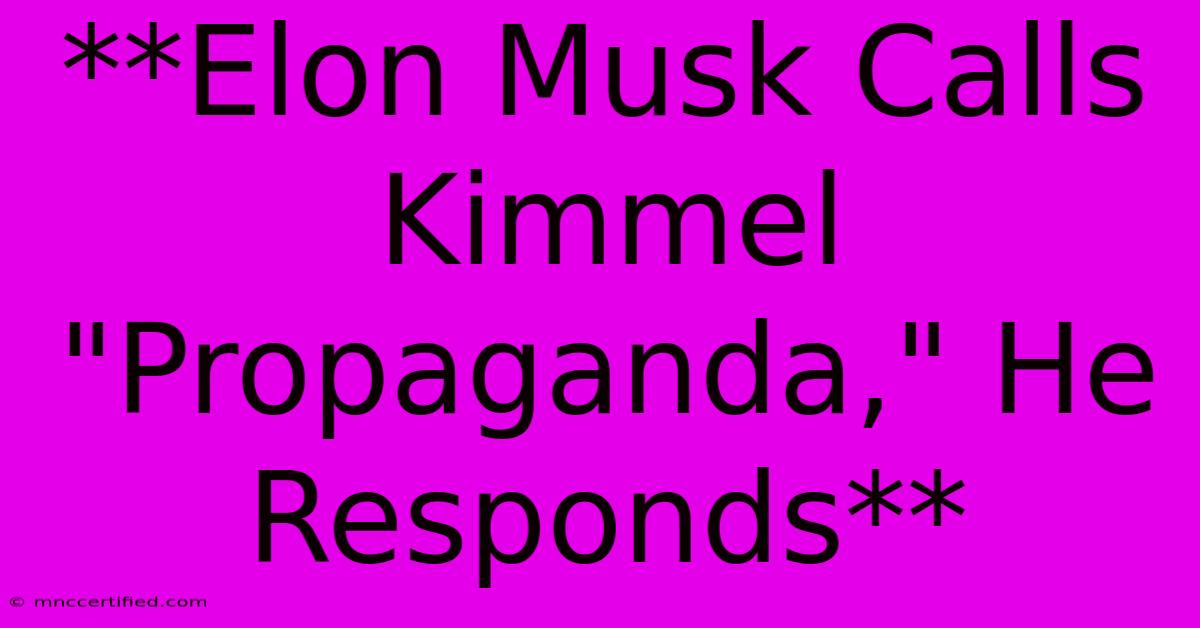**Elon Musk Calls Kimmel "Propaganda," He Responds**

Table of Contents
Elon Musk Calls Kimmel "Propaganda," He Responds: A Twitter Feud Erupts
The internet is abuzz once again with a new celebrity Twitter feud, this time featuring billionaire entrepreneur Elon Musk and late-night talk show host Jimmy Kimmel. The dispute, which erupted over Musk's recent acquisition of Twitter, has sparked debate about free speech, media bias, and the influence of powerful figures on social media platforms.
The Twitter Tussle Begins
The feud started when Kimmel, known for his comedic commentary on current events, dedicated a segment on his show to Musk's controversial Twitter takeover. In the segment, Kimmel criticized Musk's plans for the platform, suggesting that the changes could lead to increased misinformation and hate speech.
Musk, never one to shy away from a public confrontation, responded to Kimmel's comments on Twitter, calling them "propaganda." He also accused Kimmel of being "a mouthpiece for the establishment."
Kimmel's Retort: A "Free Speech" Debate
Kimmel, not one to back down from a challenge, fired back with a series of tweets of his own. He pointed out that he had been critical of both Democrats and Republicans, implying that his commentary was not politically motivated. Kimmel also defended his right to criticize Musk's actions, arguing that it was simply his job as a comedian and commentator.
The exchange has since sparked a larger conversation about free speech and the role of media in a democratic society. Some have defended Musk's right to free speech on Twitter, arguing that he is simply exercising his own opinion. Others, however, have criticized Musk's response to Kimmel, calling it an attempt to silence dissenting voices and stifle free speech.
The Larger Implications: A Shifting Social Media Landscape
The feud between Musk and Kimmel is just the latest example of the growing tension between tech giants and the media. As social media platforms become increasingly powerful, their influence on public discourse is also growing.
Musk's acquisition of Twitter has led to widespread speculation about the future of the platform, with some fearing that it will become a haven for misinformation and hate speech. Others, however, believe that Musk's changes will ultimately lead to a more free and open internet.
The feud between Musk and Kimmel highlights the complexities of this debate. It raises questions about the role of media in a democratic society, the influence of powerful figures on social media, and the future of free speech in the digital age. As the dust settles on this latest Twitter feud, one thing is clear: the battle for control of the internet is far from over.
Key takeaways:
- Free Speech vs. Media Bias: The feud highlights the ongoing debate about free speech vs. the potential for media bias and misinformation.
- The Influence of Powerful Figures: Musk's acquisition of Twitter has sparked discussions about the impact of powerful individuals on social media platforms.
- The Evolving Social Media Landscape: The feud serves as a reminder of the ever-changing nature of the internet and the challenges of navigating its complexities.
Keywords: Elon Musk, Jimmy Kimmel, Twitter, Free Speech, Media Bias, Social Media, Propaganda, Censorship, Misinformation, Hate Speech, Internet, Digital Age, Tech Giants.

Thank you for visiting our website wich cover about **Elon Musk Calls Kimmel "Propaganda," He Responds**. We hope the information provided has been useful to you. Feel free to contact us if you have any questions or need further assistance. See you next time and dont miss to bookmark.
Featured Posts
-
Shetlands Future Ashley Jensen Weighs In
Nov 08, 2024
-
Fc Barcelona And Codorniu New Collaboration
Nov 08, 2024
-
Nuveen Limited Term Municipal Bond Fund
Nov 08, 2024
-
Aclu California Trump Reelection Efforts
Nov 08, 2024
-
Does Gameday Mens Health Take Insurance
Nov 08, 2024